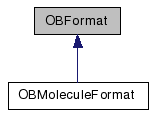
#include <obconversion.h>
Inheritance diagram for OBFormat:

Public Member Functions | |
| virtual bool | ReadMolecule (OBBase *, OBConversion *) |
| The "API" interface Read function. | |
| virtual bool | ReadChemObject (OBConversion *) |
| The "Convert" interface Read function. | |
| virtual bool | WriteMolecule (OBBase *, OBConversion *) |
| The "API" interface Write function. | |
| virtual bool | WriteChemObject (OBConversion *) |
| The "Convert" interface Write function. | |
| virtual const char * | Description ()=0 |
| Information on this format. Printed out in response to -Hxxx option where xxx id the id of the format. | |
| virtual const char * | TargetClassDescription () |
| If not provided, the object type used by the default format is used (usually OBMol). | |
| virtual const std::type_info & | GetType () |
| Returns the type of chemical object used by the format. | |
| virtual const char * | SpecificationURL () |
| Web address where the format is defined. | |
| virtual const char * | GetMIMEType () |
| Chemical MIME type associated with this file type (if any). | |
| virtual unsigned int | Flags () |
| Decribes the capabilities of the format (Read only etc.). | |
| virtual int | SkipObjects (int, OBConversion *) |
| Returns 1 on success, -1 on error and 0 if not implemented. | |
| virtual OBFormat * | MakeNewInstance () |
| Returns a pointer to a new instance of the format, or NULL if fails. | |
| virtual | ~OBFormat () |
| Format classes do not have a destructor. | |
Two sets of Read and Write functions are specified for each format to handle two different requirements. The "Convert" interface is for use in file format conversion applications. The user interface, a console, a GUI, or another program is kept unaware of the details of the chemistry and does not need to #include mol.h. It is then necessary to manipulate only pointers to OBBase in OBConversion and the user interface, with all the construction and deletion of OBMol etc objects being done in the Format classes or the OB core. The convention with "Covert" interface functions is that chemical objects are made on the heap with new in the ReadChemicalObject() functions and and deleted in WriteChemicalObject() functions
The "API" interface is for programatic use of the OB routines in application programs where mol.h is #included. There is generally no creation or destruction of objects in ReadMolecule() and WriteMolecule() and no restriction on whether the pointers are to the heap or the stack.
| virtual ~OBFormat | ( | ) | [inline, virtual] |
Format classes do not have a destructor.
| virtual bool ReadMolecule | ( | OBBase * | , | |
| OBConversion * | ||||
| ) | [inline, virtual] |
The "API" interface Read function.
Reads a single object. Does not make a new object on the heap; can be used with a pointer to an chem object on the heap or the stack.
| virtual bool ReadChemObject | ( | OBConversion * | ) | [inline, virtual] |
The "Convert" interface Read function.
Possibly reads multiple new objects on the heap and subjects them to its DoTransformations() function, which may delete them again. Sends result to pConv->AddChemObject()
Reimplemented in OBMoleculeFormat.
| virtual bool WriteMolecule | ( | OBBase * | , | |
| OBConversion * | ||||
| ) | [inline, virtual] |
The "API" interface Write function.
Writes a single object Does not delete the object; can be used with a pointer to an chem object on the heap or the stack. Returns false on error.
| virtual bool WriteChemObject | ( | OBConversion * | ) | [inline, virtual] |
The "Convert" interface Write function.
Writes a single object Deletes the object after writing Returns false on error
Reimplemented in OBMoleculeFormat.
| virtual const char* Description | ( | ) | [pure virtual] |
Information on this format. Printed out in response to -Hxxx option where xxx id the id of the format.
Must be provided by each format class. Can include a list of command line Options. These may be used to construction check boxes, radio buttons etc for GUI interface.
| const char * TargetClassDescription | ( | ) | [virtual] |
If not provided, the object type used by the default format is used (usually OBMol).
| const type_info & GetType | ( | ) | [virtual] |
Returns the type of chemical object used by the format.
Defaults to that used by the default format. Useful for checking that a format can handle a particular object.
Reimplemented in OBMoleculeFormat.
| virtual const char* SpecificationURL | ( | ) | [inline, virtual] |
Web address where the format is defined.
| virtual const char* GetMIMEType | ( | ) | [inline, virtual] |
Chemical MIME type associated with this file type (if any).
| virtual unsigned int Flags | ( | ) | [inline, virtual] |
Decribes the capabilities of the format (Read only etc.).
Currently, can be a bitwise OR of any of the following NOTREADABLE READONEONLY NOTWRITABLE WRITEONEONLY DEFAULTFORMAT READBINARY WRITEBINARY
| virtual int SkipObjects | ( | int | , | |
| OBConversion * | ||||
| ) | [inline, virtual] |
Returns 1 on success, -1 on error and 0 if not implemented.
| virtual OBFormat* MakeNewInstance | ( | ) | [inline, virtual] |
Returns a pointer to a new instance of the format, or NULL if fails.
Normally a single global instance is used but this may cause problems if there are member variables and the format is used in more than one place in the program.